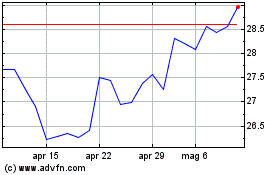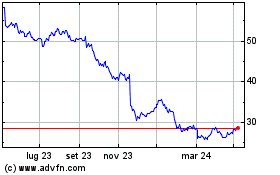By Laura Kusisto, Ruth Bender and Jacob Bunge
Bayer AG faces an extraordinary challenge as it tries to settle
tens of thousands of claims that its Roundup weedkiller causes
cancer: The product remains on the shelves, making it almost
impossible to put the litigation to rest forever.
Experts say Bayer is in an unusual position compared with other
companies that have faced multibillion-dollar lawsuits over their
products. To end mass-tort litigation, other companies generally
have discontinued or altered their products or added warning labels
-- all of which are problematic for the German pharmaceutical and
agricultural firm.
"If you're still putting out a product that people claim injures
them, I don't know how they can insulate themselves from future
liability," said Carl Tobias, a University of Richmond law
professor who studies product-liability cases. "I think they're in
a bind."
Bayer is moving closer to a settlement potentially totalling $10
billion, people familiar with the matter said, making it one of the
most complex and costly corporate litigation cases ever. Many
investors are demanding clarity and expect Bayer to deliver at
least a partial solution before the company's next annual
shareholder meeting in late April.
But Bayer's case is tricky because regulators including the U.S.
Environmental Protection Agency have said that glyphosate, the main
chemical ingredient in Roundup, doesn't cause cancer. The agency
said last year that manufacturers like Bayer can't put cancer
warnings on glyphosate-based herbicides like Roundup, and that
states can't require such labels. The company also can't alter the
product to remove glyphosate -- which plaintiffs claim poses a
cancer risk -- because it is the herbicide's main weedkilling
chemical.
Bayer has said repeatedly that glyphosate will remain an
important product and has applied for re-approval of the chemical
in the European Union, where some countries including Germany are
banning sales.
Bayer Chief Executive Werner Baumann has said any settlement
framework must come "relatively close" to guaranteeing Bayer won't
face a future wave of lawsuits. People familiar with Bayer
management's thinking said the company would take its time to reach
such a settlement, even if it angers investors seeking clarity
before the annual meeting.
The settlement talks come after Bayer lost its first three
trials with juries awarding some $2.4 billion to plaintiffs --
later reduced by judges to about $190.5 million. Bayer has
appealed, but those processes could take years to play out.
"The trials have gone so spectacularly bad for Bayer that they
don't want to go in front of another jury," said Adam Zimmerman, a
law professor at Loyola Law School, Los Angeles.
Experts said they couldn't identify another company that has
settled yet persisted in selling a product unaltered and without a
warning label. Johnson & Johnson has continued selling its
talcum powders while defending itself against some 17,000 lawsuits
alleging they cause ovarian cancer or mesothelioma, and that
J&J failed to properly warn consumers of this purported risk.
The company will face similar questions if it decides to settle the
cases.
Roundup remains on many hardware store shelves, creating a vast
pool of home gardeners who could claim it caused their cancer.
Pulling Roundup from the consumer market would cost Bayer about
$200 million in annual sales, Bernstein analysts have
estimated.
Roundup accounts for around 5% of Bayer's total sales, the
company has estimated -- sold mostly to farmers, who have stuck by
Roundup despite the cancer litigation.
The Roundup dilemma led investors last year to reject a
confidence vote in Mr. Baumann, whom some blamed for the legal
problems that followed Bayer's $63 billion acquisition of biotech
seed giant Monsanto Co. in June 2018. Monsanto is the maker of
Roundup.
Bayer lost about a third of its market value as the first jury
verdicts rolled in. The shares have bounced back since the company
and plaintiffs' attorneys began settlement talks last summer and
have agreed along the way to postpone trials. If talks were to
collapse and trials resume, Bayer's share price could get stuck in
another rout, analysts say.
Of the $10 billion under consideration in settlement talks, $8
billion would be used to pay current plaintiffs and $2 billion
would be set aside as a fund for future claims, according to people
familiar with the matter. That would exceed recent big-ticket
payouts such as Merck & Co. Inc.'s nearly $5 billion settlement
over its painkiller Vioxx and Takeda Pharmaceutical Co. Ltd.'s
roughly $2.4 billion settlement over allegations its diabetes drug
caused bladder cancer.
Many analysts say a settlement in that range would still be a
positive outcome for Bayer. But even then, it is difficult to
guarantee such a figure wouldn't eventually surpass $10 billion,
academics and lawyers say. They said the settlement under
discussion couldn't bar future plaintiffs from attempting to sue if
they deem the payouts from the $2 billion fund insufficient or if
it runs out, potentially exposing Bayer to future liability.
Even if it decided to stop selling Roundup, partially or
entirely, plaintiffs could theoretically still sue a few years from
now, experts say. Non-Hodgkin lymphoma, the type of cancer
plaintiffs say glyphosate causes, can take years to develop.
Experts said certain measures could help discourage future
litigants. As part of the settlement, plaintiff attorneys could
agree not to advertise and recruit future litigants. The federal
judge overseeing the settlement could order that any future
litigants each produce their own expert report linking their cancer
to Roundup when filing a case. That would be a hurdle for attorneys
who file large numbers of cases at once, costing several thousand
dollars per expert report.
Bayer could also eventually win its appeals, giving it an upper
hand that would discourage future plaintiffs from suing -- or even
wipe out remaining lawsuits, if a higher court rules that the
company can't warn about a cancer risk that regulators have
determined doesn't exist.
"There is a way to get more peace," Mr. Zimmerman said. "I just
don't know if it will be global peace."
Write to Laura Kusisto at laura.kusisto@wsj.com, Ruth Bender at
Ruth.Bender@wsj.com and Jacob Bunge at jacob.bunge@wsj.com
(END) Dow Jones Newswires
February 12, 2020 14:45 ET (19:45 GMT)
Copyright (c) 2020 Dow Jones & Company, Inc.
Grafico Azioni Bayer (TG:BAYN)
Storico
Da Mar 2024 a Apr 2024

Grafico Azioni Bayer (TG:BAYN)
Storico
Da Apr 2023 a Apr 2024
